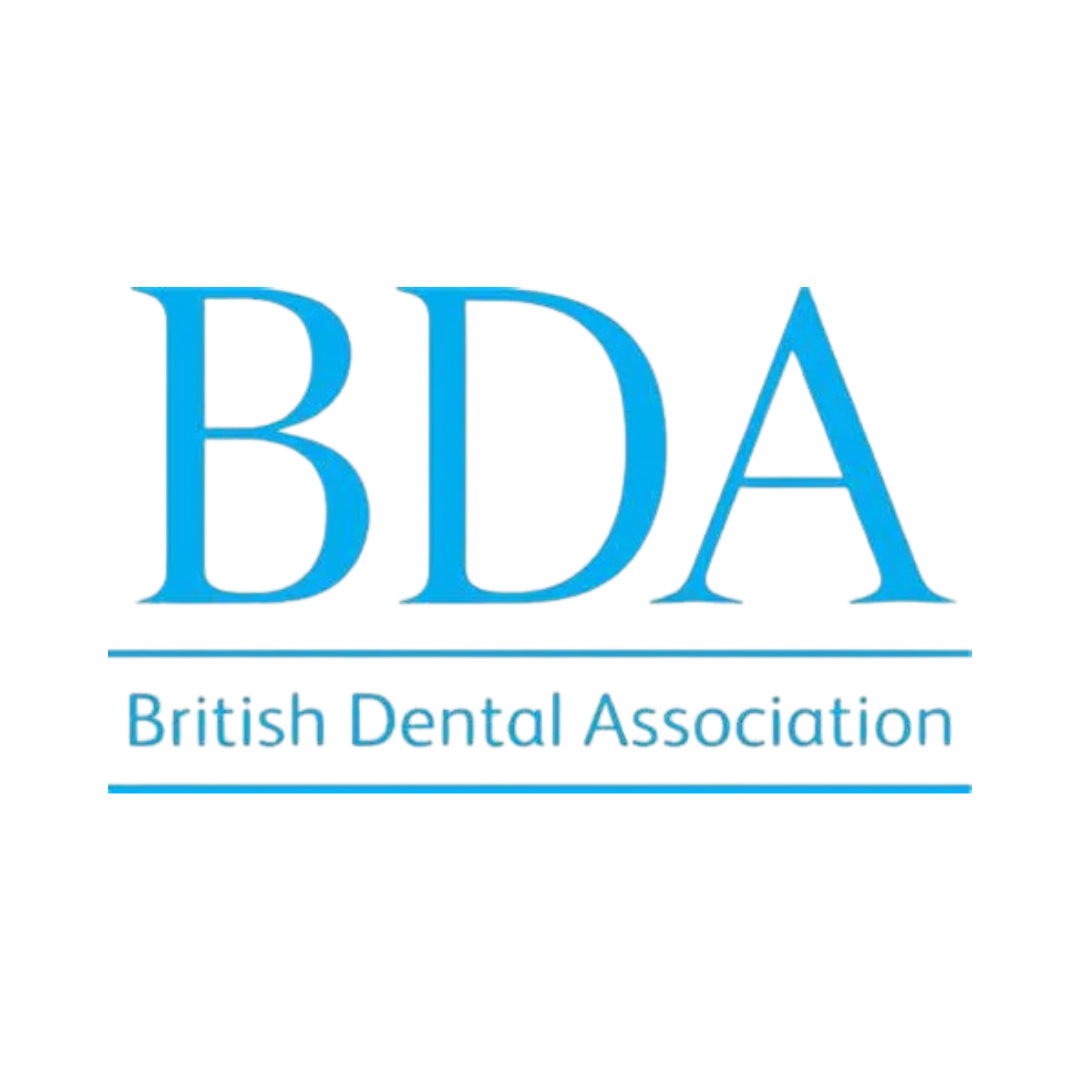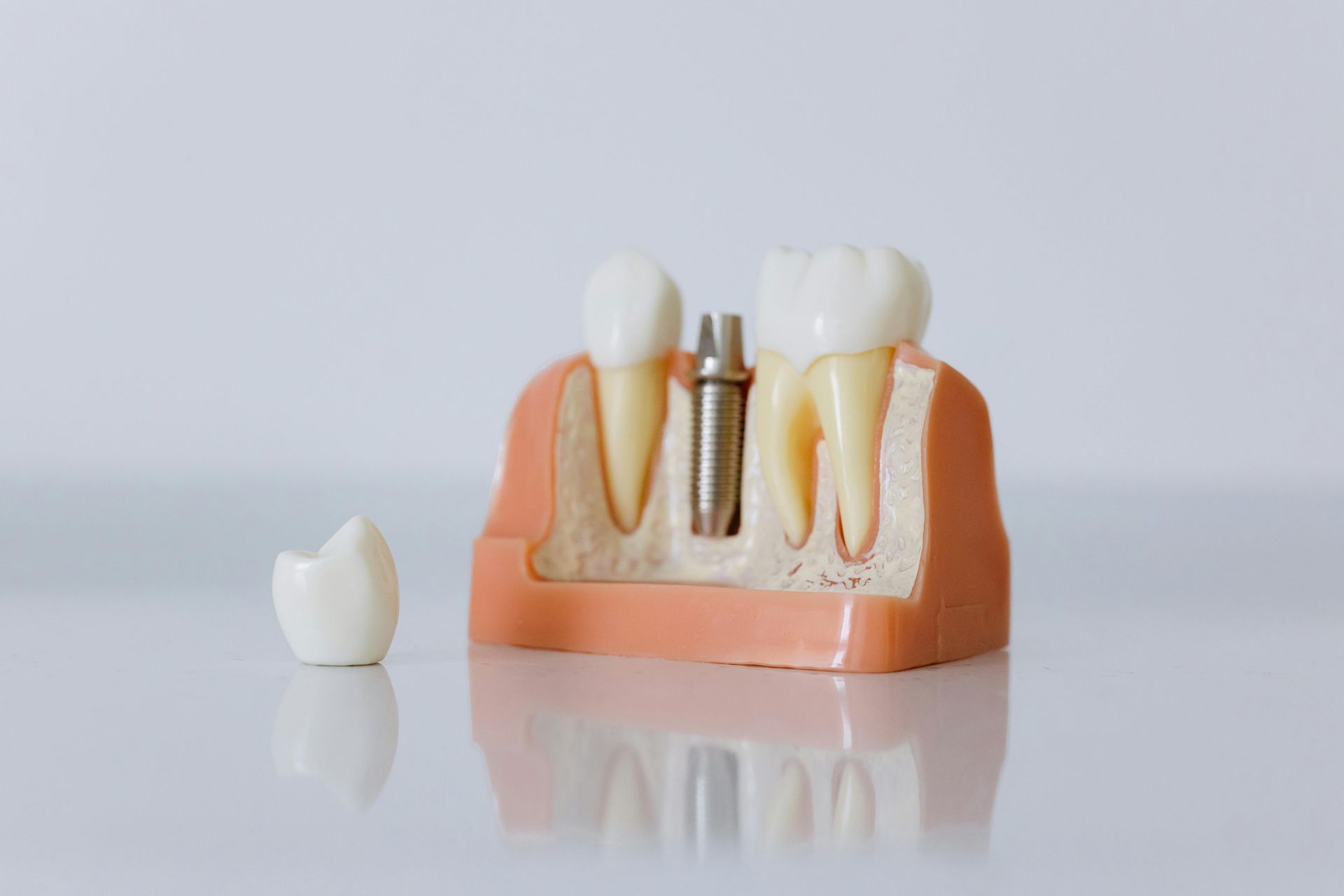What are my options if I lose teeth?
Losing teeth can feel worrying, but there are several ways to replace them. You can choose dentures (false teeth), dental bridges (which use nearby teeth for support), or dental implants. Implants are a popular choice because they look and feel more like natural teeth and help keep your jawbone healthy. Your dentist will discuss which option suits your needs best.
What is a Dental Implant?
A dental implant is a small, screw-like titanium post that is placed into your jawbone where a tooth is missing. It acts like the root of a natural tooth and provides a strong foundation to support a replacement tooth or teeth. Implants help restore your smile and chewing ability in a natural way.
How does an implant work?
Once the implant is placed into your jawbone, it gradually fuses with the bone in a process called osseointegration. This creates a sturdy anchor, similar to a natural tooth root. After healing, a dental crown (the visible part of the tooth) is attached to the implant, giving you a stable and lifelike tooth replacement.
How are implants placed?
Implant placement is usually done under local anaesthetic, so you won’t feel pain during the procedure. Your dentist makes a small opening in the gum and carefully places the implant into the jawbone. After placement, you’ll have a healing period of a few months while the implant bonds with your bone before your new tooth is fitted.
What other procedures may be needed?
Sometimes, if there isn’t enough bone to support an implant, additional procedures like bone grafting or a sinus lift may be needed to build up the jawbone. These help create a strong base for the implant. Your dentist will assess your jaw with scans and advise if this is necessary.
How are implants used?
Implants can replace a single missing tooth, support a bridge for several teeth, or even hold full dentures securely in place. They help you speak, eat, and smile confidently without worrying about false teeth slipping or moving.
What are the possible complications and how do I spot them?
Implants have a very high success rate, but like any treatment, complications can occur. These include infection, implant loosening, or inflammation of the gums around the implant. Signs to watch for are persistent pain, swelling, redness, or bleeding around the implant site. If you notice any of these, contact your dentist promptly.
Who can have implants and are they available through the NHS?
Most healthy adults can have dental implants, especially if their gums and jawbone are in good condition. However, implants are rarely available on the NHS except in exceptional cases due to their cost. Most people choose to have implants through private dental care.
Who can’t have implants?
Implants may not be suitable if you have certain health conditions such as uncontrolled diabetes, severe gum disease, or if you smoke heavily. Young patients whose jawbones are still developing usually wait until growth is complete. Your dentist will assess your medical history and mouth carefully before recommending implants.
How long do implants last for?
With good care, dental implants can last 20 years or more—often for life. The crown attached to the implant may need replacing after 10 to 15 years due to normal wear, but the implant itself is designed to be a long-term solution.
How are implants maintained?
Caring for implants is much like looking after natural teeth. Regular brushing, flossing, and dental check-ups are essential to keep the gums and implant healthy. Your dentist or hygienist will guide you on the best cleaning methods to prevent infection around the implant.
How much do implants cost?
Prices vary depending on the number of implants, complexity of the treatment, and any additional procedures needed. In the UK, single implants typically cost between £1,500 to £2,500 each. Your dentist will provide a detailed treatment plan and cost estimate before starting.
What are the alternatives?
Alternatives to implants include traditional dentures and dental bridges. Dentures are removable and less costly but may feel less secure. Bridges are fixed but require altering nearby teeth. Implants offer a more natural feel and better bone preservation but usually come at a higher cost.
I’ve seen them cheaper abroad….
Many people consider dental implant treatment abroad due to lower prices. However, it’s important to weigh this against risks such as variable quality, follow-up care difficulties, and potential complications. Implants are a long-term investment in your health, so choosing a qualified, experienced dentist you trust is essential.
What are dental implants?
Dental implants are small titanium or ceramic posts that act like the roots of missing teeth. They are placed into your jawbone to provide a strong base for replacement teeth such as crowns, bridges, or dentures. Implants look and feel natural, helping restore your smile and bite.
How do dental implants work?
Once placed into the jawbone, implants gradually fuse with the bone through a natural process called osseointegration. This creates a firm anchor, much like a tooth root. After healing, a replacement tooth is attached to the implant, giving you a stable and secure tooth that functions like your natural teeth.
How much does an implant cost?
The cost varies depending on your specific treatment plan and any additional procedures needed. Generally, a single dental implant in the UK can range from £1,500 to £2,500. Your dentist will provide a personalised quote after assessing your needs.
What does the dental implant procedure involve?
The procedure starts with a thorough assessment and scans. Then, under local anaesthetic, the implant is surgically placed into your jawbone. You’ll have a healing period of several weeks to a few months for the implant to bond with the bone. After this, your dentist will fit the replacement tooth onto the implant.
How painful is the dental implant procedure?
Most patients report the procedure is no more uncomfortable than having a tooth extracted. Local anaesthetic ensures you won’t feel pain during treatment. Some soreness and swelling afterward are normal and can be managed with pain relief and rest.
How will I look after my implant?
Dental implants are designed to look like your natural teeth. Once the crown is fitted, you should be able to smile, speak, and eat confidently without noticing the difference. Your implant will blend seamlessly with your other teeth.
What are the benefits of dental implants?
- Natural appearance and feel
- Strong and stable support for replacement teeth
- Help preserve jawbone and facial structure
- Improve chewing and speech
- Long-lasting solution
- No need to damage adjacent teeth (unlike bridges)
How successful are dental implants?
Dental implants have a success rate of around 95–98% when placed by experienced professionals and with good aftercare. With proper hygiene and regular dental visits, implants can last for many years, often decades.
Are implants suitable for everybody?
Most healthy adults can have implants, but certain medical conditions, smoking, or insufficient bone may affect suitability. Your dentist will assess your overall health and mouth carefully before recommending implants.
Am I too old to have implants?
There is no upper age limit for dental implants. Many older patients enjoy implant treatment successfully. The key factor is your general health and jawbone condition, not your age.
Can I replace my dentures with implants?
Yes! Dental implants can support fixed bridges or implant-retained dentures, which are more secure and comfortable than traditional removable dentures. This option can greatly improve your quality of life.
What are Metal-Free Implants?
Metal-free implants are made entirely from ceramic (usually zirconia) rather than titanium. They offer a biocompatible alternative for patients concerned about metal allergies or who prefer a metal-free option.
What are the specific benefits of ceramic implants?
Ceramic implants are white, so they blend well with natural teeth and gums, reducing the chance of dark lines showing at the gum. They are highly biocompatible and less likely to cause allergic reactions or gum inflammation in sensitive patients.
Is the treatment and aftercare of metal-free implants different?
The treatment process is very similar to titanium implants. Aftercare also involves good oral hygiene and regular check-ups. Your dentist will advise if any specific care is recommended for your metal-free implants, but generally, maintenance is the same.
What is a dental implant?
A dental implant is a small titanium or ceramic post that replaces the root of a missing tooth. It is surgically placed into your jawbone to support a replacement tooth, giving you a strong, natural-feeling solution for missing teeth.
How much should I pay for a dental implant?
In the UK, a single dental implant typically costs between £1,500 and £2,500. The final price depends on your individual treatment plan, including any additional procedures you may need.
Who is not suitable for dental implants?
Implants may not be suitable if you have uncontrolled diabetes, severe gum disease, heavy smoking habits, certain medical conditions, or insufficient jawbone. Your dentist will assess your suitability during consultation.
Do gums grow around implants?
Yes, healthy gums grow and attach around dental implants, helping to protect the implant and give a natural appearance similar to real teeth.
Does food get under denture implants?
Implant-supported dentures fit more securely than regular dentures, reducing food getting trapped underneath. However, some food particles can occasionally get under the denture, which is why good hygiene is important.
How does food not get under dental implants?
Dental implants with fixed crowns or bridges have tight, natural-looking contacts between teeth, preventing food from easily getting trapped beneath them. This makes cleaning easier and more comfortable.
What to avoid after dental implants?
Avoid smoking, drinking alcohol, hard or crunchy foods, and vigorous physical activity for at least a week after surgery. Also, follow your dentist’s advice on cleaning and medication to support healing.
What are the disadvantages of having dental implants?
They require surgery and healing time, can be costly, and there is a small risk of complications such as infection or implant failure. Also, not everyone is a candidate for implants.
Is it ok not to replace a missing tooth?
While it’s possible to leave a gap, missing teeth can cause neighbouring teeth to shift, affect your bite, and lead to bone loss in the jaw over time. Replacing missing teeth helps maintain oral health and function.
Can you get a dental implant on the NHS?
Dental implants are rarely available on the NHS and usually only provided in exceptional cases. Most implant treatments are done privately.
How do you clean under dental implants?
Use interdental brushes, floss designed for implants, or water flossers to gently clean around implants and beneath implant-supported dentures. Your dental team will show you the best techniques.
Can dental implants be done in one day?
In some cases, immediate implants and teeth can be placed on the same day, but most treatments require healing time between implant placement and fitting the tooth to ensure success.
Do teeth implants hurt?
The procedure is usually comfortable with local anaesthetic. Some soreness and swelling afterward are normal but manageable with pain relief.
What if you cannot afford dental implants?
Discuss alternative treatments with your dentist, such as dentures or bridges, which can be more affordable. Some clinics offer payment plans to help spread the cost.
Is a dental implant worth it?
For many, implants are worth the investment because they restore function, appearance, and confidence with a long-lasting solution.
Do I need anaesthesia for dental implant?
Yes, dental implant surgery is done under local anaesthetic to ensure you don’t feel pain during the procedure. Sedation options may also be available if you’re anxious.
Can you be awake for dental implants?
Yes, you remain awake but numb under local anaesthetic. Sedation can be offered for added relaxation if needed.
What is the best alternative to dental implants?
Removable dentures or fixed dental bridges are common alternatives, though they may not offer the same comfort or bone preservation as implants.
How long does a dental implant procedure take?
The surgical placement usually takes 30–60 minutes per implant. The full treatment, including healing and fitting the tooth, can take several months.
What is the recovery time for dental implants?
Initial healing takes about 1–2 weeks for the gums, but full integration with the bone takes 3–6 months.
Can I get a dental implant years after extraction?
Yes, implants can be placed many years after tooth loss, but sometimes bone grafting may be needed if bone has reduced.
Can you get a temporary tooth while waiting for an implant?
Yes, temporary or “flipper” teeth can be provided to fill the gap while your implant heals.
Can an implant tooth come loose?
While implants are designed to be stable, the crown or implant can loosen due to infection or failure. Regular check-ups help prevent this.
How do you fix a failed dental implant?
Treatment may involve removing the implant, treating any infection, and possibly replacing the implant after healing.
What do I do if my implant has become loose?
Contact your dentist promptly for assessment. Early attention can often save the implant.
Can 1 implant replace 2 teeth?
Yes, one implant can sometimes support a bridge to replace two adjacent missing teeth.
Is there a cheaper alternative to dental implants?
Dentures and bridges are generally less expensive alternatives but may not offer the same benefits as implants.
What is the failure rate of dental implants?
The failure rate is low, around 2-5%, especially with proper care and suitable candidates.
Are dental implants suitable to replace back teeth?
Yes, implants are very effective for replacing back teeth and restoring chewing function.
Your Trusted Dentist in Ealing
Book Your Dental Appointment in Ealing Today
Call us now or
Book online to schedule your consultation with a trusted dentist in Ealing.









